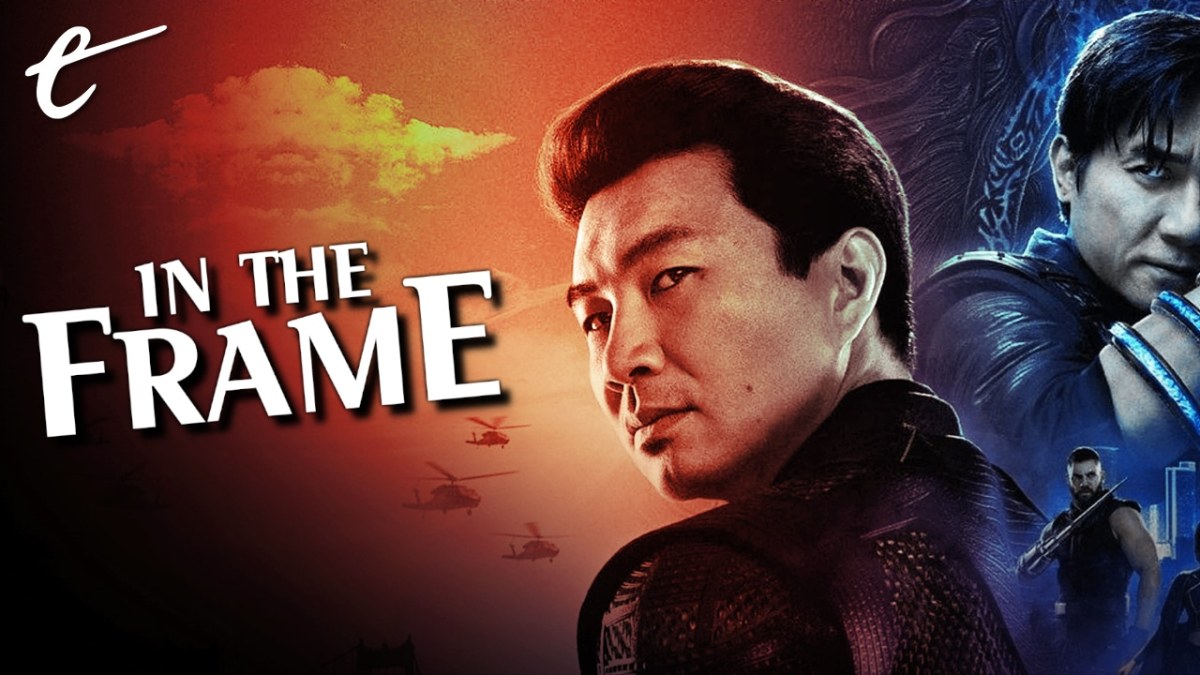This discussion of generational conflict contains spoilers for Shang-Chi and the Legend of the Ten Rings. If you haven’t seen the movie yet and would like to, bookmark this page and come back soon!
Shang-Chi and the Legend of the Ten Rings is a story of a generational conflict that trips over itself in its efforts to appeal to two very different audiences.
On the surface, Shang-Chi (Simu Liu) is a very Zoomer superhero. The movie’s prologue establishes that his parents met in 1996, the same year that the Pew Research Center now uses as the dividing line between Millennials and Generation Z. When the audience catches up with Shang-Chi, he has effectively taken a decade-long gap year from the family business and has found himself working as a valet in San Francisco. His best friend Katy (Awkwafina) still lives with her parents.
Shang-Chi has eschewed the possibility of long-term romantic entanglements, rejecting any hint of romance with Katy when her older relatives ask about marriage. The two share a lack of purpose and are accused of “running from adulthood;” joyriding in a sports car that they are supposed to valet is a highlight of their day. There’s also a sense that the pair are necessarily canny with their finances; Shang-Chi’s involvement in a fighting tournament becomes an excuse for Katy to make some money.
All of this contrasts with Shang-Chi’s father, Wenwu (Tony Leung). In some ways, Wenwu is the ultimate Boomer. Wenwu amassed tremendous power and influence by sheer luck, being in the right place at the right time. Shang-Chi and the Legend of the Ten Rings is deliberately vague on exactly how Wenwu came into possession of the eponymous jewelry, but the mysterious artifacts provided him with unlimited power that has allowed him to shape the entire world to his whims.

However, with all that power and influence, Wenwu has not made the world a better place. He owns property; the film frames much of Wenwu’s power in terms of his luxurious summer home — sorry, “compound” — with its impressive water features and fully stocked garage. The film’s central conflict is driven by Wenwu’s uncontrollable nostalgia and yearning for an idealized past potentially unleashing a monstrous evil. More than that, Wenwu simply refuses to die and surrender the stage.
As such, Shang-Chi and the Legend of the Ten Rings seems to position itself as an archetypal story of generational conflict. These are conventional narratives — stories of the older and younger generation struggling against each other, of the old giving way to the new. Star Wars might be the most famous example in American pop culture, with young Luke Skywalker (Mark Hamill) representing the Baby Boomers struggling against and eventually overcoming their own parents.
After all, there is a reason why “atonement with the father” is a part of the archetypal hero’s journey. It is an essential part of a character coming into their own. The structure of Shang-Chi and the Legend of the Ten Rings demands Shang-Chi face down his father. The movie’s climactic battle finds some measure of redemption from Wenwu, who repents at the last minute and saves his son from a monstrous evil before dying himself. It’s all very familiar; it’s all very Star Wars.
However, Shang-Chi and the Legend of the Ten Rings has its own internal conflict that it struggles to reconcile. The film cannot commit to the idea of Shang-Chi coming into his own against Wenwu, of the younger generation proving itself worthy of standing on its own two feet against its predecessors. Shang-Chi and the Legend of the Ten Rings argues instead that Shang-Chi cannot supersede his elders, but must be beholden to them.

In the film’s second half, Shang-Chi and Katy escape from his father’s compound to the mysterious and mystical village of Ta-Lo. This village was home to Shang-Chi’s mother, Jiang Li (Fala Chen). When the pair arrive, they are greeted by Shang-Chi’s aunt, Jiang Nan (Michelle Yeoh). When Shang-Chi rightly points out that the village of Ta-Lo turned its back on his mother, the community instead insists that they turned their back on Wenwu. He was never admitted into the extended family.
To the village of Ta-Lo, Wenwu was an outsider. He did not belong, even when he surrendered the power of his rings and chose to live a mortal life with his beloved wife Jiang Li. However, while Wenwu could never be accepted by the village, Shang-Chi is eagerly embraced. Indeed, the film argues that Shang-Chi must accept the traditions and rituals of the village, that the community that abandoned his mother for loving an outsider can give him the purpose he lacks.
“Your mother knew who she was,” Jiang Nan chides her nephew during a training session. “Do you?” Despite his time exploring the outside world, Shang-Chi cannot be complete until he has returned home to his mother’s distant relatives. It’s an uncomfortable narrative. Even Katy is given purpose by the villagers. When she complains that she has never found an art form that held her interest, she is given a bow and arrow and sternly told, “If you aim at nothing, you’ll never hit anything.”
Shang-Chi and the Legend of the Ten Rings seems caught between two cultures — or, at least, caught between Hollywood’s idea of these two cultures. As the Chinese market has become increasingly important to Hollywood, the studios have shifted their output to appeal to what they believe Chinese audiences (and, perhaps more pointedly, state censors) want. Marvel Studios is an example of this trend, changing Iron Man 3 and Doctor Strange to appeal to the Chinese market.

As with the live-action remake of Mulan, Shang-Chi and the Legend of the Ten Rings also seems trapped between Disney’s expectations of what American and Chinese audiences want. Kevin Feige has spent considerable time talking to concerns from Chinese audiences over the film, like the film’s decision to model Wenwu on the company’s Mandarin character and slot him into a narrative role usually reserved for racist caricature Fu Manchu. It should be noted that the film has yet to receive a release date in China, and rumors are swirling that it may not get approval at all.
Still, there is a perception that Chinese audiences want narratives that — in the words of Wu Haiyun — affirm “the protection and revitalization of tradition in the face of development.” This explains certain narrative shifts in the live-action remake of Mulan, which — to paraphrase one Chinese reviewer — turned “a story of one woman’s courage amid a cruel imperial system” into “a glorification of patriotism and filial piety.”
“Filial piety” is an important concept in contemporary China, the idea that children should be beholden to their parents and elders. In its more traditionalist interpretations, it is at odds with familiar Hollywood narratives about children coming into their own. At the end of Mulan, the title character (Liu Yifei) returns home and receives a sword with a new engraving for “xiao.” This is the character for “filial piety,” although it is translated within the film as “devotion to family.”
As such, there was understandable concern from some Chinese audiences that Shang-Chi and the Legend of the Ten Rings could become the story of “an Americanized Chinese man returning to his homeland to do battle with his traditionally minded father.” Feige addressed this criticism in conversation with Chinese critic Raymond Zhou, explaining, “It is a flaw to run away to the West and to hide from his legacy and his family — that’s how the movie is presented.”

This explains the emphasis on Shang-Chi’s return to Ta-Lo and his embrace of the village’s values. It is not that Shang-Chi returns from the outside world as a fundamentally different person who has grown; it is that Shang-Chi must return home to figure out his identity — whether he knows it or not. After all, Shang-Chi has no desire to visit his mother’s family at the start of the film, ending up there entirely by accident. His identity is determined by looking backwards rather than forwards.
This is a messy and complicated subject. Chinese filmmaker Eris Qian contends that the model of filial piety advanced by movies like Mulan has become “one of the greatest excuses for oppression, especially for women.” Chinese Canadian author Xiran Jay Zhao argues that filial piety can be “a very touchy subject in modern China” because interpretations of it can function as “a moral shackle.” It’s a tough circle to square.
Stories about characters seeking to connect with their roots and understand their heritage are fertile ground. Awkwafina recently starred in both Lulu Wang’s The Farewell and Jon M. Chu’s Crazy Rich Asians, movies dealing with this journey in moving and affecting ways. Shang-Chi and the Legend of the Ten Rings suffers from the decision to combine that story with a more conventional tale of generational struggle without any sense of nuance or how the two fit together.
Shang-Chi and the Legend of the Ten Rings tries to reconcile the struggle between these two archetypal narratives about the complicated relationship between generations: the story of a child in conflict with his father and the tale of a prodigal son returning home to pay respect to his family, both told as broadly as possible. The movie tries to have the best of both worlds and ends up a mess of irreconcilable contradictions.





